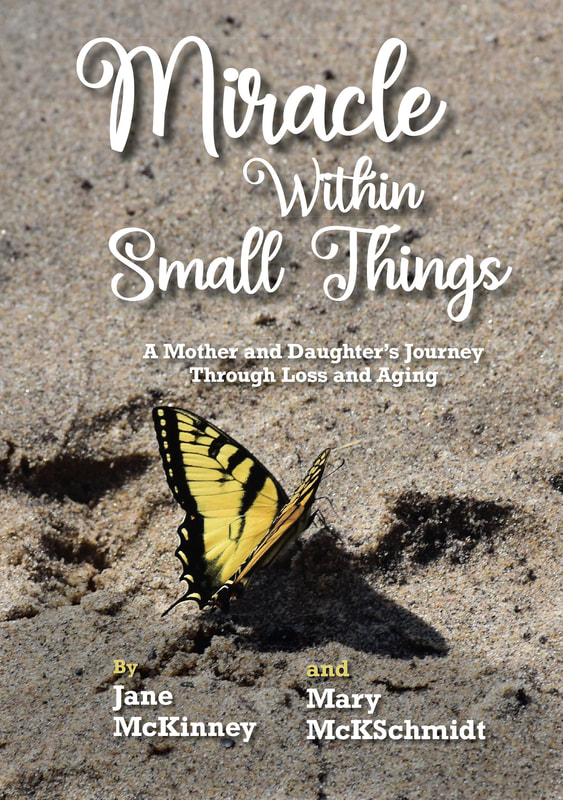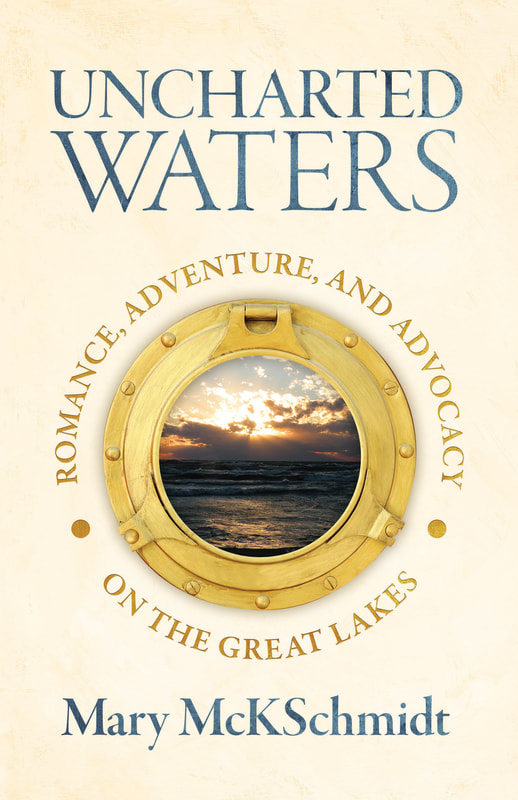 My heart was pounding beneath a rain coat crushed against my body by a stiff lifejacket zipped firmly from waist to neck. Sheets of rain engulfed me as I attempted to keep the sailboat pointed into the wind, to keep gale force winds from grabbing the giant mainsail and whipping the boat into nearby shallow waters riddled with rocks and giant boulders. The sail flapped angrily overhead, the fabric whipping through the air, the cracking sound shattering any sense of inner confidence. “Whatever you do, keep the boat in the channel,” Rubin hollered before dashing out of the cockpit and disappearing into the wall of sleeting rain. He raced to the mast to reef the sail, to reduce the size and regain control. Giant haystacks of water danced wildly alongside, white frothy tops confirming the storm’s madness. The wind peppered my face with stinging rain, blinding me to Rubin’s progress, preventing me from seeing even an outline of a channel marker. I had never been in the Straits of Mackinac, never sailed through Gray’s Reef, never before stood behind the wheel of a sailboat. After looking briefly at the charts, I was sure the passage was the width of a river, too narrow to spin the boat should Rubin be flung overboard. Mentally, I practiced the drill and saw me tossing the lifebuoy, yanking the halyard to drop the sail, spinning the wheel to backtrack and find Rubin, to pull him from the icy waters of Lake Michigan. A stream of prayers accompanied a vision of the chartered boat smashing into the rocks, the splintering of fiberglass, the freezing water rushing over my body, the current dragging me towards the Mackinac Bridge. It was over thirty years ago but if one were to ask me to define terror, I would recount that first passage through Gray’s Reef. Until now. Until seeing a video that shows underneath that stretch of often treacherous waters lie two pipelines sixty years old carrying twenty-million gallons of crude oil each day. Until hearing Dr. Val Klump, Professor and Associate Dean of Research at the University of Wisconsin-Milwaukee School of Freshwater Sciences, caution that science used to cleanup and minimize oil spill damage in the ocean most likely will not apply in the freshwaters of the Great Lakes. Until reading a report by Jeff Alexander and Beth Wallace titled “Sunken Hazard” and learning the owner of the pipelines is Canadian-based Enbridge Energy, the same company whose line ruptured in 2010 and dumped one million gallons of diluted tar sands oil into the Kalamazoo River. Roughly 175,000 gallons still blacken the riverbed three years later, the heavy globs of tar-life product nearly impossible to remove without severely damaging the river's ecosystem. Until learning from the report, found on the National Wildlife Federation website http://www.nwf.org/sunkenhazard, that the oil pipeline through the Straits is the gateway to an underground network of pipes running across Michigan and out to cities throughout the U.S. and eastern Canada. According to the report, Enbridge’s environmental track record is abysmal and includes 800 spills in North America between 1999 and 2010. The company has a history of investment in reactionary responses rather than preventive methods like replacing outdated pipelines or improving monitoring practices. Government agencies have repeatedly warned and fined the company, even pointing to the failure to maintain the pipeline as the cause of the Kalamazoo River disaster. Despite the difficulty removing the diluted tar sands oil from the river, Enbridge plans to increase the amount flowing through the Straits by almost two million gallons per day. I have a new definition of terror. For while my legs have trembled with fear in subsequent passages through the Straits when winds again knocked the boat on its side or thick, gray fog blanketed the freighter off our stern, I have also tasted dawn in the shadows of the Mackinac Bridge. I have watched the sun’s diamonds dance in our wake, breathed the crisp dampness of early morning’s air, felt the boat gliding through little ripples created as the wind skipped merrily across the lake’s surface. I have listened to the delighted calls of shorebirds celebrating day’s beginning. Terror is envisioning the sparkling blue waters of Lakes Michigan and Huron covered with the slimy sheen of oil. It is knowing the same thick, gloppy oil product poisoning the riverbed just south of our house could also blacken the sandy floor of the Straits. It is knowing that science cannot repair the damage. That prevention is the only alternative. I have been told the future of the Great Lakes depends on good science and political will. In this case, we must depend on political will. Please join me in signing the following petitions. One is to Michigan’s Governor and can be found at: https://www.change.org/petitions/governor-rick-snyder-keep-tar-sands-out-of-the-great-lakes-replace-the-enbridge-pipeline. The other goes to your U.S. Senators and can be found at: https://online.nwf.org/site/Advocacy?cmd=display&page=UserAction&id=1799 Thank you for taking a moment to get involved. © 2013 by Mary M. Schmidt
4 Comments
alene moris
9/20/2013 12:49:27 pm
Mary: Your writing makes the issue so clear and so urgent. Why do we have such a hard time preventing these tragedies? Is it only money? Or is it arrogance? Thank you for caring so deeply, Mary, and "doing something about it"! Alene
Reply
9/21/2013 03:05:22 am
Alene, I hearken back to the book you recommended titled "Soul of a Citizen: Living with Conviction in a Cynical Time." The author, Paul Rogat Loeb, tries to explain why my generation, the baby-boomers, the largest voting block in this country, has checked out of the nation’s democracy. I fear that in the country’s search to free itself from the clutches of Mideast oil, to continue our current consumption rates, to have the cheapest energy solution possible, we are willing to destroy one of our national treasures--the Great Lakes. When a catastrophe occurs--and this pipeline appears to be almost inevitable unless something is done, I fear people will point to “the government,” “those guys,” forgetting that in a democracy the government works for us. We set the priorities. We are “those guys.”
Reply
Mary Ellen Miller
9/21/2013 06:19:32 am
Exactly what Alene said. Consider this another nudge: you are on the right path, and that path needs your passion and your writing skill . . . badly. If the Great Lakes could talk, they would say, "Thank you."
Reply
Eric Stemle
10/10/2013 04:36:11 am
Whew! I'm tired just reading that account, Mary. Love the way you make the terror connection. I just started reading "The Heart of the Monster" by David James Duncan and Ron Bass. Duncan is one of my favorite authors. He writes primarily about water and water rights. This book tells the story of the Alberta oil sands project and the impact on roads in Washington and Idaho as giant vehicles transport pipeline materials. I thought of you as I started reading not only for the content but for the engaging writing style. I'm sure you would enjoy the read.
Reply
Leave a Reply. |
From briefcase to pen, paper and camera, one woman's journey to influence
how we care for the environment, our seniors, each other. Available
from your local bookstore or online retailer 
The Ideal Gift Tiny Treasures, a collection of wildflower photographs and poetic prose, available by contacting me. The 2nd Edition of Tiny Treasures is designed for use on PCs, tablets, and phones and is available at online stores. To learn more, click on the Ibook/Ebook button below:
|



 RSS Feed
RSS Feed
